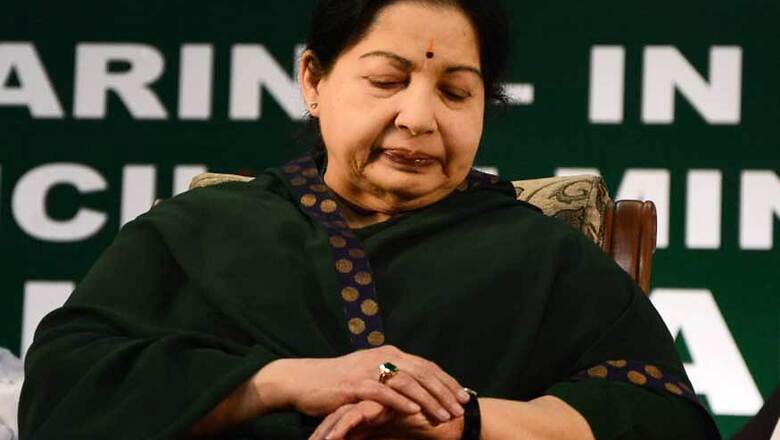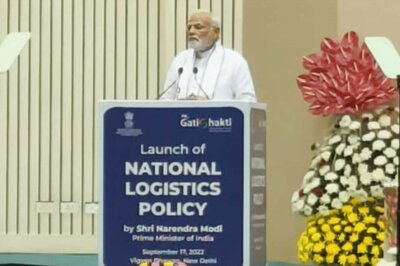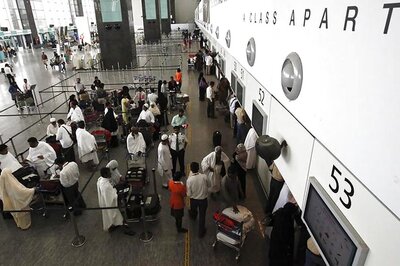
views
New Delhi: Cash and gifts to the tune of Rs 2.15 crore received by late Chief Minister J Jayalalithaa on her birthday cannot be considered lawful income, the Supreme Court said on Tuesday.
The apex court concurred with the findings of the trial court rejecting Jayalalithaa's plea that an amount of Rs 2.15 crore and foreign remittance worth Rs 77.52 lakh were received by her as birthday gifts in 1992 which should be considered as her lawful income.
These gifts were in the form of jewellery, cash, demand draft, silver items, silk sarees and framed portraits on the occasion of her birthday, the court noted.
"...In view of the incorporation of Sections 161 to 165A IPC in their letter and spirit in Prevention of Corruption Act 1988, gifts as claimed to have been made were not only prohibited by law, having regard to her office and the role attached thereto, also constitute an offence thereunder.
"By no means, therefore, the gifts in any form, as offered to Jayalalithaa during the relevant period, can be construed, having regard to the rationale and rigour of underlying objectives of this legislation, be accepted as a lawful source of income," a bench headed by Justice P C Ghose said.
The court made the observations while dealing with the defence of Jayalalithaa that the amount was received by her as gifts on her birthday, celebrated on a massive scale in 1992.
The top court rather agreed with the prosecution that the gifts, as claimed by late leader, did not constitute a lawful source of income under the PC Act.
It did not agree with the findings of the Karnataka High Court which had quantified the amount of gifts to be Rs 1.5 crore, principally referring to the income tax returns and the orders of the authorities passed thereon.
The apex court said the HC noticed that there had been a delay in submission of the IT returns but accepted the defence plea of acting on orders of the income tax authorities and seemed to have been convinced as well by the contention that there was a practice of offering gifts to political leaders on their birthdays in the state.
"Not only is the ultimate conclusion of the High Court, de hors any independent assessment of the evidence to overturn the categorical finding of the Trial Court to the contrary, no convincing or persuasive reason is also forthcoming.
"This assumes significance also in view of the state of law that the findings of the income tax authorities/forums are not binding on a criminal court to readily accept legality or lawfulness of the source of income, as mentioned in the income tax returns by an assessee, without any semblance of inquisition into the inherent merit of the materials on record relatable thereto," the apex court said.
It said that not only was this aspect "totally missed by High Court, no attempt seems to have been made by it to appraise the evidence adduced by parties in this regard, to come to self-contained and consummate determination.
"To reiterate, disclosure of such gifts in the income tax returns of A1 (Jayalalithaa) and the orders of the income tax authorities on the basis thereof, do not validate the receipts to elevate the same to lawful income to repel the charge under Section 13(1)(e) thereof."
"Gifts to Jayalalithaa, a public servant in the context of Sections 161 to 165A IPC now integrated into the Act, are visibly illegal and forbidden by law. The endeavour to strike a distinction between 'legal' and 'unlawful' as sought to be made to portray gifts to constitute a lawful source of income is thus wholly misconstrued.
"With the advent of the 1988 Act, and inter alia consequent upon the expansion of the scope of definition of the 'public servant' and the integration of Section 161 to 165A IPC in the said statute, the claim of the defence to treat the gifts offered to A1 on her birthday as lawful income, thus cannot receive judicial imprimatur," the bench said.



















Comments
0 comment